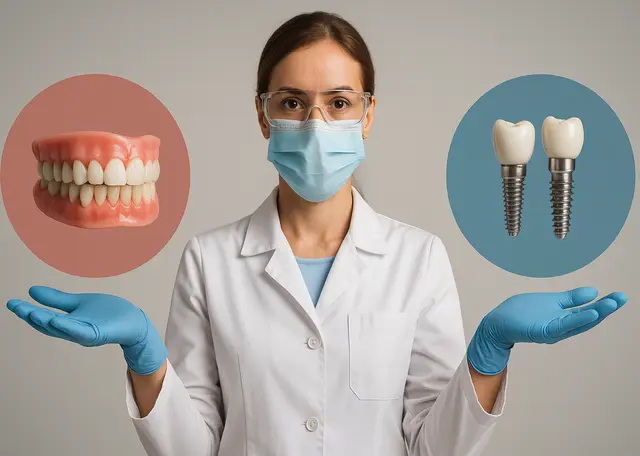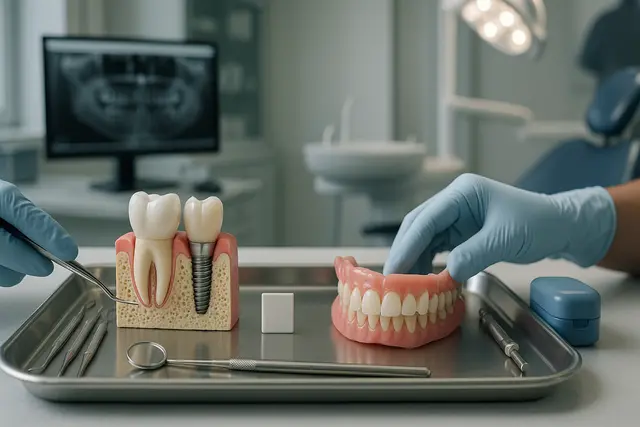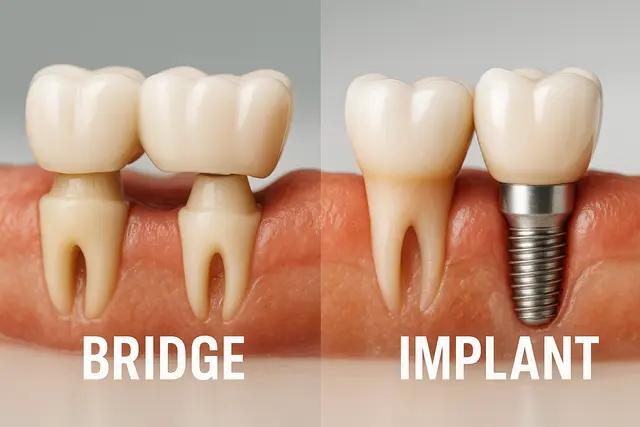Prosthodontics
5 min read
Oct 17, 2025
Full Mouth Implants vs. Dentures: Which Is Better for You?
When it comes to replacing missing teeth, the choice between full mouth dental implants and dentures can be overwhelming. Each option has its own set of benefits, limitations, and long-term considerations, making it essential to understand what works best for your needs, health, and lifestyle.

Let’s talk teeth. Whether you're missing a few or dealing with a full house of gaps, figuring out the best tooth replacement option can feel like navigating a maze blindfolded. Dentures vs implants? Full mouth dental implants or traditional dentures? Snap-in or screw-in? And what’s this about bone loss?
If your smile is feeling more like a jigsaw puzzle than a masterpiece, this guide will help you make an informed decision. No sugarcoating, just real talk from a trusted dental perspective.
The Denture Decision
Dentures have been around forever. Okay, not quite since the dinosaurs, but George Washington probably had a set stashed somewhere. Dentures are removable prosthetics designed to replace missing teeth, either partially or completely. If you've ever seen a glass of water with teeth in it, those are dentures.
Dentures provide an affordable, non-surgical way to restore a smile. Full dentures replace an entire upper or lower set of teeth. A partial denture fills in gaps where only some teeth are missing. Since dentures are removable, they’re pretty easy to clean and maintain with proper care.
But there’s a catch. Actually, a few. Dentures tend to shift while talking or chewing. They rely on suction or adhesive to stay in place, which isn’t always foolproof. Plus, because dentures sit on the gums instead of anchoring into the jawbone, they don’t stimulate the jaw. Over time, that can lead to bone loss, and that’s no joke.
Implant: The Game Changer
Now let’s get into the superstar of modern tooth replacement. The dental implant. A dental implant is a titanium post that gets placed into the jaw, acting like a root for your new tooth. Over time, the bone fuses with the implant in a process called osseointegration (fancy word, very cool thing). Then a crown, bridge, or prosthetic attaches to the implant, making it strong, stable, and, get this, permanent.
Dental implants also preserve the jawbone, help maintain your facial structure, and feel more like natural teeth. They don’t shift around like dentures do, and they don’t rely on glue or daily removal.
Full Mouth Dental Implants vs. Dentures
Here’s where things get interesting. When people need a full set of replacement teeth, they often have two main options: full mouth dental implants or full dentures.
With full mouth implants, a dentist places several implants (usually 4 to 8) per arch, and then attaches a fixed or removable prosthetic on top. Implant-supported dentures, like snap-in dentures, are one variation. These supported dentures lock into the implants but can be removed for cleaning.
Compared to dentures, implants are more secure and help prevent jawbone deterioration. They look, feel, and function more like natural teeth. Dentures may be the better option if surgery or cost is a concern, but implants offer a better long-term investment in many cases.
The Difference Between Dentures and Implants
Let’s break down the big difference between dentures and implants:
Denture: Sits on top of your gums, doesn’t stimulate the jawbone, may shift or slip, and usually needs replacing every 5–10 years.
Implant: Anchored into the jaw, stimulates the bone, feels stable and natural, and, bonus, dental implants can last decades with proper care.
That difference affects more than just how your mouth feels. It changes how you eat, speak, smile, and even how your face ages. Yes, really. Dentures don’t stop jawbone shrinkage. Implants do.
Pros and Cons of Dentures
We promised to keep it real, so here’s a quick look at the pros and cons of dentures:
Pros:
Dentures are more affordable upfront.
Quick, non-invasive solution.
Great for people who can’t have surgery.
Cons:
Dentures tend to loosen over time.
May cause sore gums.
Can affect taste and how you chew.
Don’t stop bone loss.
Since dentures are made from acrylic or resin, they need to be replaced more frequently than implants. And because dentures are removable, they require nightly soaking and proper care.
Implants and Dentures Together?
Yep, it’s not always either-or. Some folks use implants and dentures in combo. These are implant-supported dentures or snap-in dentures. They give you more stability than traditional removable dentures, but you can still take them out. Think of them as the best of both worlds, especially if you want stability without a full arch of implants.
Dental Implants and Dentures Compared
Let’s do a little side-by-side. When it comes to dental implants vs dentures, here's how they stack up:
Feature | Dentures | Dental Implants |
Stability | Can slip or move | Rock solid |
Comfort | May cause gum irritation | Feels like real teeth |
Lifespan | 5–10 years | 20+ years |
Bone Health | May cause bone loss | Prevents bone loss |
Maintenance | Needs nightly cleaning | Brush like normal teeth |
Cost | Less expensive than dental implants | Higher upfront cost |
Appearance | Good | Often indistinguishable from natural teeth |
Tooth Replacement That Works for You
Choosing between dentures or dental implants isn’t just about cost or comfort. It’s about lifestyle. If you want to bite into an apple without worry, implants may be the better pick. If you're looking for a quick fix to replace missing teeth, dentures offer a faster, less invasive route.
But remember, implants require healthy gums and jawbone. If you've had bone loss, a bone graft may be needed first. The number of implants used and the dental implant procedure itself also affect recovery time and cost.
Trusted Dental Advice for Your Next Step
We get it, this is a big decision. But you don’t have to figure it out alone. A dental professional can evaluate your mouth, jawbone, and gum health to recommend the best tooth replacement option for your smile and budget.
The good news? Both dentures and dental implants can restore your confidence. And if you're feeling overwhelmed, take a breath. Your future smile is in good hands.
Regular dental checkups, proper care, and choosing a trusted dental provider make all the difference. Whether you go for full mouth restoration with dental implants or stick with traditional removable dentures, the goal is the same: bringing back your smile, your comfort, and your bite.
What Is the Main Difference Between Full Mouth Dental Implants and Dentures?
The primary difference lies in how they are supported. Dentures rest on the gums and are removable, while full mouth dental implants are anchored into the jawbone using titanium posts. Implants offer greater stability, preserve bone health, and mimic the feel and function of natural teeth. Dentures, although more affordable and non-surgical, may shift during use and do not prevent bone loss over time.
Are Dental Implants Better Than Dentures for Long-Term Use?
Yes, dental implants are generally considered a better long-term solution. They can last 20 years or more with proper care and help preserve jawbone structure, preventing facial sagging. Dentures, by contrast, typically last 5–10 years, may cause gum irritation, and often need adjustments as the jawbone changes shape over time due to bone loss.
What Are Implant-Supported Dentures and How Do They Work?
Implant-supported dentures, also called snap-in dentures, combine features of both implants and traditional dentures. They use dental implants as anchors, which the denture locks onto for improved stability. Unlike regular dentures, they don’t shift while eating or speaking and can be removed for cleaning. They’re a great option for patients who want more security without committing to a full set of permanent implants.
How Do I Decide Between Dentures and Full Mouth Implants?
The right choice depends on your oral health, budget, lifestyle, and personal preferences. Dentures are less invasive and more affordable upfront, making them suitable for those who can’t undergo surgery. Full mouth implants offer superior comfort, bone support, and long-term value but require healthy gums and sufficient jawbone. A dental professional can assess your needs and guide you toward the best option for your smile.
Read Next
Related Posts

Prosthodontics
Implant vs. Dentures Pros and Cons: A Deep Dive into Modern Solutions
Missing teeth can impact more than just your smile, they can affect how you eat, speak, and feel about yourself. Fortunately, modern dentistry offers two leading solutions to bring back both function and confidence: dentures and dental implants. Understanding the pros and cons of each can help you make the choice that fits your needs, lifestyle, and budget.
7 min read
Oct 17, 2025

Prosthodontics
Tooth-Supported Bridge vs. Implant Comparison: Benefits, Drawbacks, and Insights
Deciding between a dental bridge and a dental implant can feel overwhelming, especially when both options promise to restore your smile and improve oral function. Each solution comes with its own set of benefits, considerations, and ideal use cases, making it essential to understand how they compare before choosing what’s right for you.
6 min read
Oct 17, 2025

Prosthodontics
Dental Implants vs. False Teeth Comparison: A Side-by-Side Look at Options
Losing teeth can be a life-changing experience, affecting everything from your smile to how you eat and speak. Fortunately, modern dentistry offers reliable solutions to restore both function and confidence. This article explores the key differences between dental implants and false teeth, helping you understand which option might suit your needs best.
6 min read
Oct 16, 2025
Don’t have time to research every dentist around you?
See why 30k+ patients trusted us